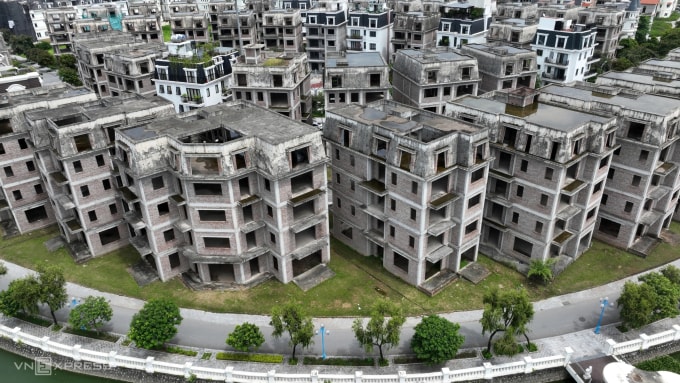Investing in the rumored 'land fever' can leave investors stuck for years, even losing all their assets, causing instability in the market.

At the beginning of the year, land prices in many localities showed signs of local heating. In provinces and cities with information about mergers, areas predicted to be new centers recorded a sudden increase in real estate prices.
According to the reporter's records, the selling price of land in many places such as Hung Yen City, Van Giang District (Hung Yen), Viet Tri City, Ninh Binh City, Bac Giang City ... has been increasing by 5 - 15% compared to the end of last year. Many landowners even advertised prices to increase by more than 20% to benefit from the "wave" of mergers.
In the Southern region, the interest level and selling prices of areas such as Binh Duong, Ba Ria - Vung Tau or Nhon Trach (Dong Nai) also tend to increase rapidly. Data from the Batdongsan channel shows that selling prices in some areas show signs of "heating up" when they have increased by 20 - 30% compared to the end of last year.
Rapid fluctuations in land prices at the beginning of the year pose many risks, especially for F0 investors (first-time market participants). Mr. Dinh Minh Tuan, Director of Batdongsan channel in the Southern region, said that the F0 group participating in the market mainly buys quickly and sells quickly to make a profit.
A study by this channel shows that more than 86% of real estate buyers today are investing in "surfing" to make a profit. The time from when they buy to when they sell is only 1 year. Only 14% of buyers keep the property for more than 1 year.
If the local merger plan is slower than expected or the planning changes, this group's "surfing" plan will easily fail, because not every location will increase in price without development motivation.
In case of buying a plot of land that is affected by planning, investors will be stuck because of the high risk of losing liquidity. Mr. Tuan said that this risk not only causes financial losses but can also lead to legal disputes, wasting the buyer's time and effort.
Investing in "waves" of rumors also makes investors susceptible to buying high and selling low, resulting in investment losses. Mr. Pham Duc Toan, General Director of EZ Property Company, said that land prices in many localities have increased sharply by 30-50% following the "land fever" in the period of 2020-2021. If investors do not know the actual price range, they can easily buy and sell land in the province at a loss, or when they need to sell, they cannot make a transaction due to lack of liquidity.
Recalling the time 17 years ago, the situation of "jumping" land prices, people rushing to buy land once swept the market of the capital and the neighboring provinces. Before the National Assembly approved the merger of Ha Tay into Hanoi, all real estate segments in this area from Ha Dong, Hoai Duc to Me Linh jumped sharply in price a year before. Mr. Pham Duc Toan said that from residential land, land plots to service land, garden land... all were pushed up 2-3 times after half a year.
However, when the merger officially took effect, the psychology of buying and selling according to expectations also decreased very quickly. Mr. Toan said that the areas that were predicted to be the places to "catch the strongest wave" had to reduce prices deeply at times to gain liquidity. Many venture capitalists used leverage to rush into the land fever, then struggled to "cut losses" to quickly withdraw money, otherwise they would lose their assets.

Not to mention, the rate of investors winning thanks to the real estate "wave" is very low, according to Mr. Nguyen Chi Thanh, General Director of Ho Tay International Building Company. He said that the only beneficiaries of the previous "waves" were the group that created the fever, the brokers and a few lucky long-term investors. Because most F0 investors want to invest money with the crowd but are slower to receive information, have less knowledge and experience. They may be willing to use financial leverage, mortgage assets to join the game with the mentality of buying quickly, selling quickly, and making huge profits.
"When the fever reaches its peak, speculators withdraw from the market, leaving behind many consequences for later buyers," he said.
According to experts, real estate prices do not only depend on merger information but are also influenced by many other factors such as location, infrastructure, planning, job demand, immigration and the local economy. Mr. Dinh Minh Tuan said that buyers need to carefully survey factors affecting land prices such as location, legality, area, and surrounding amenities. These factors not only ensure safe long-term investment but also have the ability to exploit business, avoiding land abandonment.
To limit the situation of speculation pushing up land prices, "surfing" to find the difference, the measure of taxing real estate has been mentioned again by many experts. Mr. Le Hoang Chau, Chairman of the Ho Chi Minh City Real Estate Association, said that he has proposed many times the measure of imposing a tax on real estate transfers over time to cool down the speculative wave. If the real estate transfer transaction has a holding period of less than 6 months, the tax rate is 5%, 6-12 months is 4%, over 1-2 years is 3%, after 3 years the current tax rate of 2% is still applied.
At a recent seminar on personal income tax, Associate Professor Dr. Phan Huu Nghi, Deputy Director of the Institute of Banking and Finance (National Economics University) proposed that the operator apply a 20% tax on the difference between the purchase price and the sale price of real estate, similar to corporate income tax. This solution, according to him, helps limit the situation of pushing up real estate prices.
Decree 96, which stipulates a number of articles of the 2023 Law on Real Estate Business, effective from August 1, clearly states that the State will implement measures to regulate the market if the transaction price index increases or decreases by more than 20% within three months. The Ministry of Construction is responsible for assessing market fluctuations based on price indexes, transaction volume, and socio-economic indicators in other fields related to real estate.
TB (according to VnExpress)